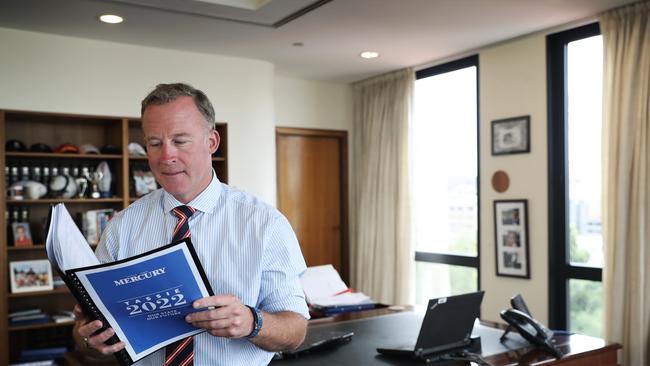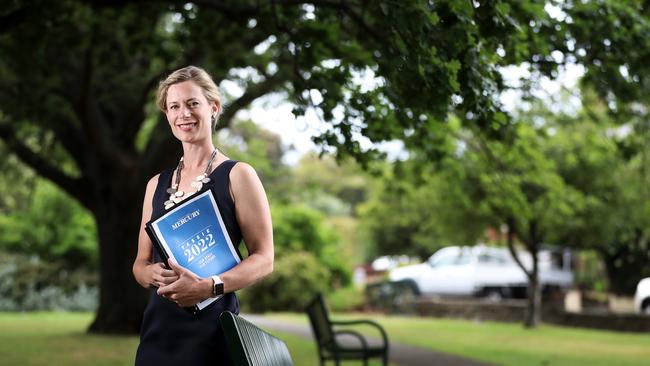Tassie 2022: The issues Tasmanians care about, and how governments should address it
ALMOST 800 Tasmanians have told the Mercury what issues they care most deeply about and how future state governments should address those concerns. DAVID KILLICK reports.

Politics
Don't miss out on the headlines from Politics. Followed categories will be added to My News.
FROM mid-December to early January, the Mercury asked readers for thoughts on how to balance development with conservation, what their cost-of-living pressures were, and how Tasmanian businesses could compete in the 21st century global marketplace.
We have since delivered the results — and every idea you raised in the open-ended questions — to Premier Will Hodgman, Opposition Leader Rebecca White and Greens Leader Cassy O’Connor.
Here’s some of the best.
MORE: TASSIE’S TOP TEN BIGGEST ISSUES
When asked how Tasmania can align development and conservation, 55.48 per cent of respondents regarded greater protection of the natural environment as very important — only 5 per cent felt that it was not important.
One third felt that a statewide planning scheme was necessary while others called for a strategic planning summit between conservationists and developers.
“Through community consultation with expert panels, [we can] develop clearly articulated statements of the long-term, desired, social, environmental and economic outcomes (targets) for Tasmania,” said one respondent.
Readers overwhelming said that improving educational opportunities would improve shared wealth across the state.
MORE: GROUPS UNITE IN FUTURE VISION
Just under 70 per cent of respondents indicated that it was very important and pointed to the push for all students to finish Year 12 as a good step.
“We must break the cycle of families that don’t value education,” one reader said.
Most readers agreed that living expenses (energy and water), lack of wage growth and housing were affecting our cost of living.
Many urged the State Government to come up with a plan for affordable housing as soon as possible while others requested further renewable energy subsidies and a cap on Airbnb in the major cities, particularly Hobart.

Surprisingly, more than half of the respondents said childcare was not important when calculating the effect on their cost of living.
Forget tougher jail sentences or building a second prison, Tasmanians want more investment in rehabilitative and preventive programs to improve law and order.
More than 40 per cent of respondents want this investment and a further 35 per cent want us to improve our understanding of the causes of crime.
“Mandatory sentencing does not prevent crime,” said one reader. “Education and opportunities for young people at identified risk due to circumstances from which criminality arises is very important. Early intervention and school and community support [are] essential.”
“Education and opportunity are the only solutions to crime,” said another.
More than 50 per cent of respondents said it was very important to align future industry growth with climate change as new technologies and skills rapidly change the agribusiness/technology, science and innovation sectors.
“We have all the solutions we need to deal with climate change/other challenges,” said one. “What we need most is leadership in implementing policies that promote these solutions over old technologies.”
A total of 20.20 per cent said it was not important to embrace global investment amid warnings not to “sell off the farm” and “be careful of international investment”.
The state’s reputation as an arts and culture hub is flourishing and 27 per cent of respondents said it was very important to capitalise on the Mona effect in regional areas.
While there was support a for a long-term creative vision for the arts scene, few felt it was important to invest in a new arts nucleus for Hobart.
“Art flourishes around Tasmania but Hobart attracts the investment,” said one reader. “This investment needs to be decentralised, supporting artists at hubs around the state.”
To increase educational attainment in Tasmania, 48.6 per cent of respondents made it very clear there needs to be a focus on the needs of the student, not the institution.
“Support children from low socio-economic families to attend early childhood education separate from school,” was a common theme.
About 50 per cent of respondents felt that abolishing the college system was not important, but anecdotally there were many calls to revitalise the TAFE system to increase lifelong learning.
“We need to ensure that education is an ongoing process for the entire life of an individual,” said one.
“Resuscitate TAFE and improve trades education. There are many underemployed graduates in the state who are frustrated,” said another.
Tasmania should focus on being a high-end premium destination first and foremost (34 per cent) and not open itself up for mass commercial tourism (49.81 per cent).
A total of 41.57 per cent said it was not important to open up more developments in national parks.
Many respondents said national parks under increasing pressure from tourism growth needed to be managed sustainably.
“Align tourism development with environmental and cultural values. DO not destroy our greatest assets with a near-sighted, money-grabbing lack of vision,” said one.
Many Tasmanians were concerned that making a high-end, premium tourist location would push out those who could not afford to live there.
“Tasmanian families should have free access to national parks and so should school groups.”
Transport concerns provoked strong responses, with 41 per cent supporting active transport options such as walking and cycling as fixes to relieve congestion in Hobart.
There were many calls for park-and-ride solutions requiring hubs out of city centres, with more public transport around the CBD.
“Get people out of the habit of driving their cars into the centre of the CBD. Put up parking costs and build free or nominal charge parking stations linked to bus and ferry interchanges. We must get cars out of the city,” said one.
There was also strong support for light rail (34.97 per cent) and a River Derwent ferry network (36.73 per cent). More than 30 per cent of respondents regarded building more roads as not important.
Hospital waiting lists elicited strong responses from readers, with 59.56 per cent agreeing on the importance of reducing waiting lists while at the same time developing the state’s three main hospitals supported by regional medical centres (51.93 per cent).
Anecdotally, respondents want a greater investment in preventive health and a bigger spend on keeping the aged in their own homes for as long as possible, which could mean encouraging more private investment.
Tasmanians are also calling for more supported accommodation for people with mental illness.
While reducing payroll tax (27.83 per cent) and stamp duty (21.20 per cent) were regarded as important issues to fire up business and employment/manufacturing, improving freight links to key interstate and overseas markets was far and away the most important consideration (51.16 per cent).
“Bass Strait is the most expensive body of water in the world to cross,” said one respondent.
“[We want] passengers and freight at a subsidised cost so Tasmanian produce can access Melbourne. Make this service part of a true National Highway,” said another.
Lifestyle disadvantages needed to be removed for rural and remote Tasmanians by plugging holes in the state’s social safety net (31.12 per cent), improving transport (36.18 per cent) and removing disparity between private and public health systems.
“Tasmania has a two-tier society. Some of us are very comfortable, others are considerably marginalised,” said one respondent.
Regarding sport, 31.64 per cent thought grassroots participation sports like netball and hockey as very important considerations for government funding.
A total 43.40 per cent said funding was not important for AFL, while 37.43 per cent said there should be less funding for cricket.
“We desperately need small clubs throughout our community. Access to community clubs and societies (not just sport) is essential to counter increasing social isolation.” said one. “Sport which encourages a healthy lifestyle should be the priority for government funding as it reduces pressure on the health budget over time.”


